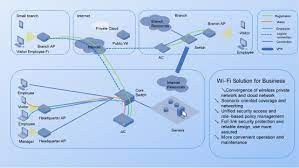In today’s world, staying connected has become an essential part of our lives. With the increasing need for seamless connectivity, WiFi and network solutions have become a crucial aspect of both personal and professional life. From homes to offices, schools to hospitals, WiFi and network solutions have become an integral part of our daily routine.
WiFi technology has revolutionized the way we connect to the internet. It allows us to access the internet wirelessly from anywhere in our homes or offices. With the advent of smart devices such as smartphones, tablets, laptops, and smart TVs, WiFi has become even more important. A strong and reliable WiFi connection can make a significant difference in our daily lives.
Network solutions are also critical for businesses of all sizes. A well-designed network infrastructure can enhance productivity and improve communication between employees. It allows employees to share files and collaborate on projects seamlessly. Network solutions also enable businesses to manage their IT resources more efficiently.
One of the most significant benefits of WiFi and network solutions is that they provide flexibility and mobility. With a wireless connection, you are not tied down to a specific location or device. You can move around freely while staying connected to your network or the internet.
In addition to providing flexibility, WiFi and network solutions also offer enhanced security features. Advanced security protocols such as WPA2 encryption ensure that your data is protected from unauthorized access while using a wireless connection.
Another advantage of using WiFi and network solutions is that they are cost-effective. A wireless connection eliminates the need for expensive cabling infrastructure, which can save businesses a significant amount of money on installation costs.
Overall, WiFi and network solutions have become an essential aspect of modern life. They provide us with seamless connectivity, enhanced productivity, flexibility, mobility, security features, and cost-effectiveness. As technology continues to advance rapidly in this field, it is crucial that we stay up-to-date with the latest developments in order to take full advantage of these benefits.
6 Benefits of WiFi and Network Solutions: Enhancing Productivity, Efficiency, Security, Scalability, Flexibility and Reliability
7 Common Cons of WiFi and Network Solutions: Understanding Security Risks, Interference, Range and Speed Limitations, Cost, Maintenance, and Compatibility Issues
- Security risks
- Interference
- Range limitations
- Speed limitations
- Cost
- Maintenance
- Compatibility issues
Increased Productivity
In today’s fast-paced business environment, productivity is key. Companies are always looking for ways to increase efficiency and streamline their operations. One way to achieve this is by implementing WiFi and network solutions.
WiFi and network solutions provide employees with access to the same resources and data from any location. This means that employees can work from home, on the road, or at a client’s site while still having access to the same tools and information they would have in the office. This increased flexibility can help employees work faster and more efficiently.
With WiFi and network solutions, employees can collaborate on projects in real-time, regardless of their location. They can share files, communicate through messaging apps or video conferencing tools, and work together seamlessly. This collaboration can lead to faster decision-making, improved problem-solving, and ultimately increased productivity.
In addition to collaboration benefits, WiFi and network solutions also offer remote access capabilities. Employees can access company systems from any location with an internet connection. This means that they can complete tasks outside of regular office hours or during travel time, maximizing their productivity.
Finally, WiFi and network solutions allow for better communication between team members. With tools like instant messaging apps or video conferencing software, employees can communicate quickly and efficiently without having to be in the same physical location. This leads to fewer misunderstandings or delays in communication which ultimately increases productivity.
In conclusion, WiFi and network solutions are essential for businesses looking to increase productivity. By providing employees with access to the same resources from any location, enabling collaboration on projects in real-time, offering remote access capabilities, and improving communication between team members – companies can significantly improve their operations’ efficiency while reducing costs associated with physical office space requirements.
Cost Efficiency
In today’s world, cost efficiency is a critical factor for businesses looking to stay competitive. One of the significant advantages of using WiFi and network solutions is that they can significantly reduce costs associated with purchasing additional hardware and maintaining multiple networks for different locations or departments.
With WiFi technology, businesses can eliminate the need for expensive cabling infrastructure. This can save them a significant amount of money on installation costs, making it a more cost-effective solution than traditional wired networks. Additionally, WiFi technology allows businesses to connect multiple devices to a single network, reducing the need for additional hardware.
Network solutions also provide cost savings by allowing businesses to manage their IT resources more efficiently. With a well-designed network infrastructure, businesses can centralize their IT resources and reduce the need for multiple servers and other hardware at different locations. This can lead to significant savings in hardware and maintenance costs over time.
Another way that WiFi and network solutions can reduce costs is by improving productivity. With faster and more reliable internet connections, employees can work more efficiently, reducing the time spent on tasks and increasing productivity levels. This increased productivity translates into cost savings for businesses in terms of reduced labor costs.
Overall, cost efficiency is one of the most significant advantages of using WiFi and network solutions in business settings. By eliminating the need for additional hardware and reducing maintenance costs associated with multiple networks, businesses can save money while improving productivity levels. As technology continues to advance rapidly in this field, it is crucial that businesses stay up-to-date with the latest developments to take full advantage of these benefits.
Improved Security
In today’s digital age, data security has become a major concern for businesses of all sizes. With the increasing number of cyber threats and attacks, companies need to ensure that their data is protected from unauthorized access or malicious attacks. WiFi and network solutions provide an effective way to enhance security and protect against cyber threats.
One of the key benefits of using WiFi and network solutions is improved security. By using a centralized security system, all connected devices are protected against unauthorized access or malicious attacks. This makes it easier for companies to keep their data safe and secure.
A centralized security system allows businesses to monitor and control access to their network. This means that only authorized users can access sensitive data or information, reducing the risk of data breaches or cyber attacks. In addition, network solutions can provide advanced security features such as firewalls, intrusion detection systems, and antivirus software to further enhance protection against cyber threats.
With WiFi and network solutions, businesses can also implement strict access controls to their networks. This means that only authorized users can connect to the network using secure login credentials such as usernames and passwords. This reduces the risk of unauthorized access by hackers or other malicious actors.
Another advantage of using WiFi and network solutions is that they allow businesses to monitor network activity in real-time. This means that any suspicious activity can be detected immediately, allowing businesses to take prompt action before any damage is done.
In conclusion, improved security is one of the key benefits of using WiFi and network solutions for businesses. By implementing a centralized security system, companies can protect their data from unauthorized access or malicious attacks. With the increasing number of cyber threats in today’s digital age, it has become essential for companies to invest in robust security measures to safeguard their data and information.
Scalability
Scalability is one of the most significant benefits of WiFi and network solutions. It refers to the ability of a system to handle an increasing number of users or devices without affecting its performance or functionality. WiFi and network solutions are highly scalable, which means that businesses can easily add new users or devices without having to invest in additional hardware or software licenses.
This feature is particularly beneficial for small businesses that are looking to grow and expand their operations. As a business grows, it needs to accommodate more users and devices on its network. With WiFi and network solutions, adding new users or devices is a simple process that does not require significant investment in additional hardware or software.
Scalability also allows businesses to be more agile and responsive to changing market conditions. For example, if a business suddenly experiences an increase in demand for its products or services, it can quickly add new users or devices to its network without worrying about performance issues.
In addition, scalability also allows businesses to save money on IT infrastructure costs. Instead of investing in expensive hardware and software licenses upfront, they can start with a smaller system and gradually scale up as their needs grow.
Overall, scalability is a crucial pro of WiFi and network solutions. It provides businesses with the flexibility they need to grow and expand their operations without having to worry about IT infrastructure limitations. With this feature, businesses can focus on what they do best – delivering high-quality products and services – while leaving the IT infrastructure management to the experts.
Flexibility
Flexibility is one of the most significant advantages of WiFi and network solutions, especially for businesses. With the ability to quickly adapt their networks according to their changing needs, businesses can save a significant amount of money and time.
Gone are the days when businesses had to purchase new equipment every time they needed an upgrade. With WiFi and network solutions, businesses can easily add or remove devices from their networks without having to invest in new infrastructure. This allows them to scale up or down their networks as per their requirements.
For example, if a business expands its operations or hires new employees, it can quickly add new devices to its existing network without having to purchase additional hardware. Similarly, if a business downsizes or restructures its operations, it can remove devices from its network without any hassle.
This flexibility also allows businesses to experiment with different types of devices and technologies without making a significant investment. They can test out new devices on their existing networks before deciding whether they want to invest in them on a larger scale.
Furthermore, this flexibility also allows businesses to work remotely or from different locations while staying connected to their networks. With remote work becoming more common in today’s world, this feature has become even more critical.
In conclusion, flexibility is a crucial advantage of WiFi and network solutions for businesses. It enables them to quickly adapt their networks according to changing needs without having to invest in new equipment every time they need an upgrade. This not only saves them money but also allows them to experiment with different technologies and work remotely while staying connected with ease.
Reliability
In today’s fast-paced world, having a reliable internet connection is crucial for both personal and professional use. With the increasing need for seamless connectivity, WiFi and network solutions have become an essential part of our daily lives. One of the most significant advantages of using these solutions is their reliability.
Networking solutions provide reliable connections between multiple devices across different locations. This ensures that users have uninterrupted access to the resources they need when they need them most. With a reliable network infrastructure in place, businesses can keep their operations running smoothly without any interruptions or delays.
Reliability is especially important for businesses that rely heavily on internet connectivity to carry out their daily operations. For instance, online retailers require a stable internet connection to process orders, manage inventory, and communicate with customers. Similarly, healthcare providers need a reliable network to access patient records and communicate with other medical professionals.
In addition to businesses, individuals also benefit from the reliability of WiFi and network solutions. A stable internet connection is necessary for online classes or remote work. It also ensures that we can stay connected with our loved ones through video calls or messaging apps.
Overall, the reliability of WiFi and network solutions is crucial in today’s world where we rely heavily on technology to carry out our daily tasks. A stable internet connection ensures that we can stay connected and productive at all times without any interruptions or delays. As technology continues to advance rapidly in this field, it is essential that we stay up-to-date with the latest developments to take full advantage of these benefits.
Security risks
While WiFi and network solutions offer numerous benefits, one significant con is the increased security risks associated with wireless networks. Wireless networks are more vulnerable to security breaches than wired networks, making them a prime target for cybercriminals.
One of the main reasons why wireless networks are more vulnerable is because they broadcast their signal over the airwaves. This means that anyone within range of the signal can potentially access it if they have the right tools and knowledge. Cybercriminals can use various techniques such as packet sniffing, rogue access points, and man-in-the-middle attacks to intercept and steal sensitive information.
Another reason why wireless networks are more vulnerable is that they often use weak passwords or no passwords at all. This makes it easy for cybercriminals to gain access to the network and steal sensitive data.
To mitigate these security risks, it is crucial to implement strong security protocols such as WPA2 encryption and strong passwords. It is also essential to keep software and firmware up-to-date with security patches and updates.
Businesses should also consider implementing additional security measures such as firewalls, intrusion detection systems, and virtual private networks (VPNs). These measures can help protect against unauthorized access and data theft.
In conclusion, while WiFi and network solutions offer numerous benefits, it is essential to be aware of the increased security risks associated with wireless networks. By implementing strong security protocols and additional measures, businesses can reduce their vulnerability to cyberattacks and protect their sensitive data.
Interference
One of the significant drawbacks of WiFi and network solutions is interference. Wireless signals can be disrupted by other wireless devices, such as microwaves and cordless phones. This interference can cause signal degradation, which can lead to slower internet speeds and dropped connections.
Interference occurs when two or more wireless signals overlap in the same frequency range. This interference can cause data packets to be lost or delayed, resulting in a slower internet connection. In some cases, interference can even cause a complete loss of connectivity.
One common source of interference is household appliances such as microwaves and cordless phones. These devices operate on the same frequency range as WiFi signals and can disrupt the wireless signal if they are placed too close to the router.
Another source of interference is neighboring WiFi networks. If multiple networks are operating on the same channel, they can interfere with each other, causing signal degradation and slower internet speeds.
To overcome this issue, it is essential to choose the right channel for your WiFi network. Most modern routers have an automatic channel selection feature that selects the least congested channel available. It is also recommended to place your router away from other wireless devices and household appliances that could cause interference.
In conclusion, while WiFi and network solutions offer many benefits, they do have their drawbacks. Interference caused by other wireless devices is a significant issue that needs to be addressed for optimal performance. By choosing the right channel for your network and placing your router away from potential sources of interference, you can minimize this issue and enjoy a seamless wireless experience.
Range limitations
While WiFi and network solutions offer many benefits, one of the significant drawbacks is the range limitation. The range of a wireless network is limited, which means that it may not cover the entire area where multiple devices need to be connected.
This can be particularly problematic in larger homes or offices where there are multiple rooms and floors. If the wireless router is located in one corner of the building, it may not provide enough coverage for devices located in other areas. This can result in weak or inconsistent signals, leading to slower internet speeds and dropped connections.
To overcome this limitation, some people may choose to install additional access points or repeaters to extend the range of their wireless network. However, this can be an expensive solution and may not always provide a reliable connection.
Another option is to use wired connections such as Ethernet cables or powerline adapters. These solutions are not limited by range and can provide a more stable and faster connection than wireless networks. However, they require additional cabling infrastructure and may not be suitable for all situations.
In conclusion, while WiFi and network solutions offer many benefits, it is essential to consider their limitations as well. Range limitations can be a significant issue for larger homes or offices with multiple rooms and floors. It is important to evaluate your needs carefully and choose the best solution that meets your requirements while staying within your budget.
Speed limitations
While WiFi and network solutions have become an integral part of our daily lives, they do come with some drawbacks. One of the most significant limitations of wireless connections is their speed. Compared to wired connections, wireless speeds are usually slower, which can pose a problem for activities such as streaming video or gaming online.
The reason for this speed limitation is that wireless signals have to travel through the air, which can cause interference and signal loss. This interference can be caused by various factors such as walls, other electronic devices, and even weather conditions.
For those who rely on high-speed internet for activities such as streaming movies or playing online games, a slow WiFi connection can be frustrating. While there are ways to improve WiFi speeds such as upgrading your router or using signal boosters, these solutions may not always be effective.
However, it’s important to note that not all wireless connections are slow. The latest WiFi standards such as 802.11ac and 802.11ax offer faster speeds than previous generations. Additionally, advancements in technology have led to the development of mesh networks that provide better coverage and faster speeds than traditional routers.
In conclusion, while speed limitations are a con of WiFi and network solutions, it’s important to remember that there are ways to improve your connection. As technology continues to evolve rapidly in this field, we can expect faster and more reliable wireless connections in the future.
Cost
While WiFi and network solutions offer numerous benefits, there are also some drawbacks that need to be considered before making the switch. One of the main disadvantages of WiFi and network solutions is the cost involved in setting up and maintaining a wireless network.
Compared to wired networks, wireless networks require additional hardware such as access points, which can increase the overall cost significantly. Additionally, maintaining a wireless network can be more complex and time-consuming, which may require additional resources such as IT support.
Furthermore, while wireless networks offer flexibility and mobility, they may not always provide consistent speeds or reliability. Factors such as distance from the access point or interference from other devices can impact the quality of the connection.
Despite these drawbacks, WiFi and network solutions remain a popular choice for both personal and professional use due to their numerous benefits. However, it is important to carefully consider the costs involved in setting up and maintaining a wireless network before making a decision. Businesses should weigh the potential benefits against the costs to ensure that they are making an informed decision that aligns with their needs and budget.
Maintenance
While WiFi and network solutions have undoubtedly revolutionized the way we connect to the internet, they do come with their own set of challenges. One significant drawback of using wireless networks is the need for regular maintenance and monitoring.
Wireless networks require regular updates and maintenance to ensure optimal performance and security levels. Without proper maintenance, wireless networks can experience connectivity issues, slow speeds, and even security breaches. Regular monitoring is also necessary to detect any unauthorized access or suspicious activity on the network.
Maintenance can be time-consuming and costly, especially for businesses with large networks. It requires trained IT professionals who are knowledgeable about the latest technologies and security protocols. In some cases, businesses may need to hire third-party IT service providers to manage their network infrastructure.
Another challenge associated with maintenance is that it can disrupt normal business operations. Regular updates and maintenance may require downtime, which can impact productivity and revenue generation.
Despite these challenges, it is crucial that businesses prioritize regular maintenance and monitoring of their wireless networks. Neglecting these tasks can lead to serious consequences such as data breaches, loss of revenue, and damage to brand reputation.
In conclusion, while WiFi and network solutions offer numerous benefits such as flexibility, mobility, enhanced productivity, security features, and cost-effectiveness; they do require regular maintenance and monitoring. Businesses must invest in trained IT professionals or third-party service providers to ensure optimal performance and security levels. By doing so, businesses can enjoy all the benefits of wireless networks without compromising on security or performance.
Compatibility issues
While WiFi and network solutions have become an integral part of our daily lives, there are some drawbacks to consider. One of the most significant disadvantages is compatibility issues. Not all devices are compatible with all types of wireless networks, which can make it difficult to connect certain devices or use certain features on them.
For example, some older devices may not support the latest WiFi standards, which can result in slower connection speeds or difficulty connecting to a network altogether. Similarly, some devices may require specific network settings or configurations that are not supported by all routers or access points.
Compatibility issues can also arise when trying to connect different types of devices together on a network. For example, connecting a Windows computer to an Apple AirPort router may require additional setup steps due to differences in the way the two systems communicate.
These compatibility issues can be frustrating and time-consuming to troubleshoot. In some cases, it may be necessary to purchase new equipment or upgrade existing hardware in order to achieve full compatibility with all devices on a network.
Despite these challenges, it is still important to stay up-to-date with the latest WiFi and network technologies in order to take advantage of their many benefits. As technology continues to advance rapidly in this field, it is likely that compatibility issues will become less common over time. In the meantime, it is important for users to be aware of potential compatibility issues and work towards finding solutions when they arise.




